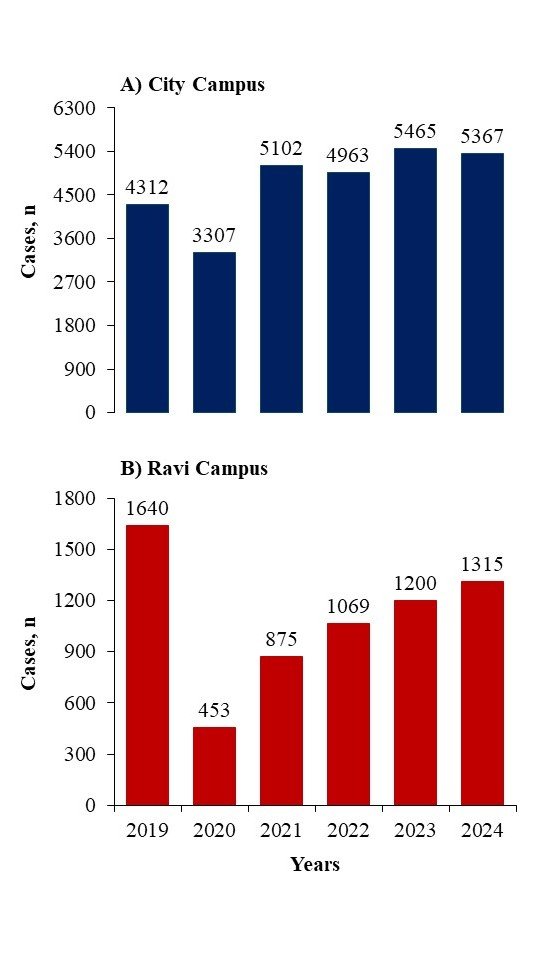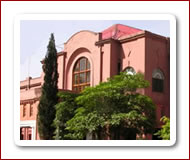| Theriogenology |
SERVICESThe department operates at City Campus, Lahore as well as Ravi Campus, Pattoki. At City Campus, it comprises of theriogenology laboratory, theriogenology clinic, animal shed and mice colony. At Ravi Campus, it comprises of theriogenology teaching hospital, animal shed and a state-of-the-art embryology laboratory. At both campuses, the department provides outdoor and indoor facilities for the diagnosis, management and treatment in a diverse range of species. Moreover, it also devises improved reproductive management strategies for small and medium sized dairy farmers. The department also owns one of the most established veterinary diagnostic and research ultrasonography facility in Pakistan Clinical Cases
ADVISORY/CLINICAL/EXTENSION SERVICES
Clinical Case Handling: This bar graph represents the number of clinical cases handled at City Campus, Lahore (red bars) and Ravi Campus, Pattoki (blue bars) over the last 4 years. The motives of consultation range from physiological cases (heat check, artificial insemination, pregnancy diagnosis etc) to pathological presentations (anestrus, repeat breeding, endometritis etc) and more complex obstetrical scenarios (prolapse, torsion, dystocia etc). The aforementioned motives are received in a wide range of domestic species, including though not limited to, small animals (cat, dog), small ruminants (sheep, goat), large ruminants (buffalo, cow) as well as equine (donkey, horse) and camelids.
Theriogenology Teaching Hospital: This newly established facility at Ravi Campus, Pattoki has been designed according to the international guidelines of safe and effective working practices. The animal handling chute extends from the entry to exit of the animal handling area thus facilitating smooth handling of clinical cases. In picture, Dr. Usman Arshad giving a brief overview of the components of the hospital including an ultrasound room, operation theater, semen laboratory, seminar room and doctor’s offices. A wide range of animals including pet animals, small and large ruminants, horses and camels are received for variable motives of consultation regarding reproductive follow-ups.
Training and Extension: 5 Days Training on Reproductive Ultrasonography in Domestic Animals is a signature training of the department which attracts more than 25 participants from all over Pakistan every year, since 6 years. In picture, Dr. Amjad Riaz is holding an ice-breaking session with the participants. The training focuses on hands-on practice on 5 species including bovine, caprine, ovine, equine and canine. In addition, refresher courses for vets, paravets and farmers are routinely carried out regarding artificial insemination and improved reproductive management.
Continuing Education: The faculty members of the department actively participate in cascading of in-service faculty professional development programs. In picture, Dr. Muhammad Zahid Tahir is HEC certified Master Trainer having received basic and advanced MT-FPDP training from Islamabad and Turkey, respectively. Currently, he is enrolled in distant learning program (PG Certificate in Veterinary Education) at Royal Veterinary College, UK. The course aims to equip the participants with the skills that would help them evolve as an effective educator and a reflective practitioner, with the ultimate goal of providing an enhanced learning experience to the students.
Experimental Animal Sheds: The department houses 2 experimental shed, one at each campus which serve as important workstation for training of undergraduate, research of postgraduate and training of human resources. The department is well reputed in continuing education and in-service training of AI workers nominated by the government of Punjab, Sindh, Balochistan, KPK and Gilgit-Baltistan. In picture, Dr. Kamran Jahangir, a renowned veterinarian from Canada is engaging with the participants of International Workshop on Small and Large Animal Practice.
In Vitro Embryology Laboratory: The first and state-of-the-art facility for in-vitro embryo production of indigenous buffalo and cattle in Pakistan. This laboratory serves as a platform for training of postgraduate students in all aspects of in vitro culture and extending to the ovum pickup in large animals. In picture, the postgraduate students are busy in collection and selection of good quality embryos. The aim of this facility to establish harvesting techniques of oocytes from elite animals and optimize the embryo transfer technology in order to exploit the genetic potential of our indigenous breeds.
Mice Breeding Facility: The mouse is the premier mammalian model system for reproductive biotechnology research. Scientists from a wide range of biomedical fields have gravitated to the mouse because of its close genetic and physiological similarities to humans and animals, as well as the ease with which its reproduction can be manipulated and analyzed. This platform facilitates research projects of postgraduate students, allows provision of mice to researchers within and outside the university and basic trainings on in vitro fertilization and embryo culture.
|










